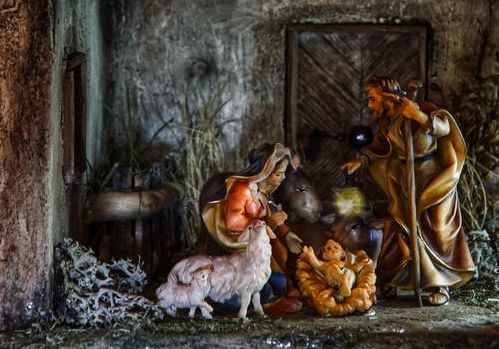“For unto us a child is born, unto us a son is given: and the government shall be upon his shoulder: and his name shall be called Wonderful Counselor, The mighty God, The everlasting Father, The Prince of Peace. Of the increase of his government and peace there shall be no end, upon the throne of David, and upon his kingdom, to order it, and to establish it with justice and with righteousness from this time forth even forever. The zeal of the LORD of hosts will perform this.” (Isa 9:6-7, KJ2000)
These wonderful words came forth by the Spirit of God long after David and Solomon died and their throne and kingdom came to an end. It is obvious to those who walk by faith that it is Jesus Christ and His kingdom that Isaiah was speaking of because HE is the Prince of Peace, the Mighty God, and the Everlasting Father. There has been no end to the increase of His government and peace since the foundations of the world.
Many of the Jews and their leaders knew this passage and saw by the signs and miracles Jesus did that He was not just a prophet or just a good teacher, but if He was really the promised Messiah, when was He going to flex His real power on this earth and make the kingdoms of men into the kingdoms of God? And of course to them it meant that He would set the Jewish leaders as the heads of His world-wide government! But God and Jesus was and is Spirit and their kingdom is a spiritual kingdom. Jesus said that God’s kingdom “is not coming in ways that can be observed, nor will they say, ‘Look, here it is!’ or ‘There!’ for behold, the kingdom of God is in the midst of you.” (Luke 17:20-21, KJ2000). Yes, His kingdom is wherever Jesus is King, in our hearts, and not in this physical world or among its leaders with all their hidden agendas.
Samuel prophesied this to King David:
And when thy days be fulfilled, and thou shalt sleep with thy fathers, I will set up thy seed after thee, which shall proceed out of thy bowels, and I will establish his kingdom. He shall build an house for my name, and I will establish the throne of his kingdom forever. I will be his father, and he shall be my son… (2Sam 7:12-14, KJV)
Samuel was speaking of the Son of God, not Solomon. The kingdom of Israel was unified under David’s son, Solomon, but was divided upon his death between one of his sons and one of his generals. Israel has been divided and conquered ever since. Even today’s Israel is not that kingdom that was once ruled over by Solomon, which was ten times larger but is now is overrun by Gentile nations. So what could this prophesy of a kingdom that will last forever be speaking of other than the kingdom of God? Only Jesus Christ will sit upon the throne of David and over his kingdom, to establish it and to uphold it with justice and with righteousness from this time forth and forevermore.” The increase of Israel’s government came to an abrupt end in 68AD when the Roman soldiers sacked Jerusalem and the temple, not leaving one of its stones upon another, and killed and scattered the people of Israel all over the Roman Empire. Even now those who rule in modern Israel are divided against one another. The only thing that unifies that country is the fact that they are surrounded by enemies and come together in a common defense with their carnal weapons.
Where is this house that David’s seed was to build after him? Solomon’s temple? This too was only an earthly manifestation of what God has been building with living stones from the foundation of the world. It is sad how many Christians are as blind today as the Jews were during Christ’s first coming as they speak of Israel as “God’s chosen people” and are blind to their own birthright as the household of faith. Part of the problem is that as Jesus said, “Not everyone who says unto me, “Lord, Lord” shall enter the kingdom of heaven, but those who do the will of my Father.” These do greatly err because they look to the place occupied by the Dome of the Rock as if it were God’s “Mount Zion on the sides of the north, the city of the Great King,” expecting a new temple to be built there when the New Testament says so clearly that the temple of God is one made of living stones. Peter wrote:
As you come to him, a living stone rejected by men but in the sight of God chosen and precious, you yourselves like living stones are being built up as a spiritual house, to be a holy priesthood, to offer spiritual sacrifices acceptable to God through Jesus Christ. (1Pet 2:4-5, ESV2011)
Jesus is the cornerstone of that house, since Isaiah prophesied:
Therefore, thus says the Lord GOD, “Behold, I am the one who has laid as a foundation in Zion, a stone, a tested stone, a precious cornerstone, of a sure foundation: ‘Whoever believes will not be in haste.’ (Isa 28:16, ESV2011)
Jesus is the Cornerstone and Foundation of that house. Men are always trying to pull down what is heavenly and spiritual into the natural where they can manipulate it and control people. Today there is an “apostles and prophets movement” that claims to be the foundation the church and I have never seen such a display of carnality in my life as what I have seen in their writings, websites and meetings! Paul wrote:
According to the grace of God given to me, like a skilled master builder I laid a foundation, and someone else is building upon it. Let each one take care how he builds upon it. For no one can lay a foundation other than that which is laid, which is Jesus Christ. (1Cor 3:10-11, ESV2011 – emphasis added)
Yes, let each one of these so-called “apostles and prophets” take care!
God spoke to Abraham and said, “And in thy seed shall all the nations of the earth be blessed; because thou hast obeyed my voice” (Gen 22:18, KJV). This is the promise that Paul wrote about.
Now to Abraham and his seed were the promises made. He saith not, And to seeds, as of many; but as of one, And to thy seed, which is Christ. (Gal 3:16, KJV)
The people of God are not a people of a common blood line, religion, nationality, political leaning or set of doctrines, but are those who walk in the faith of Abraham, faith in Jesus Christ alone. Jesus told the Jews, “Abraham saw my day and he rejoiced.” Jesus spoke to Abraham even back then and he believed. “For he was looking forward to the city that has foundations, whose designer and builder is God” (Heb 11:10, ESV2011). These Jewish leaders thought they had that city and the temple system under their control in an unholy alliance with Rome, and they were not about to give that up to the Son of the Vineyard Owner. Prophesying His own death, Jesus said, “But when the tenants [or the vineyard] saw the son, they said among themselves, This is the heir; come, let us kill him, and let us seize his inheritance” (see Matt. 21:33-41).
So the chief priests and the Pharisees gathered the council and said, “What are we to do? For this man performs many signs. If we let him go on like this, everyone will believe in him, and the Romans will come and take away both our place and our nation.” (John 11:47-48, ESV2011)
It was here that they started plotting Christ’s death. When the Jews rejected Jesus as their Messiah and King, they rejected their place in God’s kingdom and it resulted in their own demise because this passage out of Matthew goes on…
“And they took him and threw him out of the vineyard and killed him. When therefore the owner of the vineyard comes, what will he do to those tenants?” They said to him, “He will put those wretches to a miserable death and let out the vineyard to other tenants who will give him the fruits in their seasons.” Jesus said to them, “Have you never read in the Scriptures: ‘The stone that the builders rejected has become the cornerstone; this was the Lord’s doing, and it is marvelous in our eyes’? Therefore I tell you, the kingdom of God will be taken away from you and given to a people producing its fruits. And the one who falls on this stone will be broken to pieces; and when it falls on anyone, it will crush him.” (Matt 21:39-44, ESV2011)
Yes, “the kingdom of God will be [and was] taken away from you [them] and given to a people producing its fruits.” The gospel took root among the Gentile believers and those Jews who rejected that old temple system and produced fruit for the Master who is in heaven. But when the Jews repent and “look upon Him whom they have pierced” and weep and mourn, “On that day there shall be a fountain opened for the house of David and the inhabitants of Jerusalem, to cleanse them from sin and uncleanness.” (Zech 13:1, ESV2011. See also Zech 12:10-14).
With God His promises have always been given to those who walk by faith, just as it’s written…
But without faith it is impossible to please him: for he that comes to God must believe that he is, and that he is a rewarder of them that diligently seek him. (Heb 11:6, KJ2000)
For no one is a Jew who is merely one outwardly, nor is circumcision outward and physical. But a Jew is one inwardly, and circumcision is a matter of the heart, by the Spirit, not by the letter [of the law]. His praise is not from man but from God. (Rom 2:28-29, ESV2011)
For as many of you as have been baptized into Christ have put on Christ. There is neither Jew nor Greek, there is neither bond nor free, there is neither male nor female: for ye are all one in Christ Jesus. And if ye be Christ’s, then are ye Abraham’s seed, and heirs according to the promise. (Gal 3:27-29, KJV)
And Moses verily was faithful in all his house, as a servant, for a testimony of those things which were to be spoken after; But Christ as a son over his own house; whose house are we, if we hold fast the confidence and the rejoicing of the hope firm unto the end. (Heb 3:5-6, KJV)
Dear saints, we need to quit looking to the kingdoms of this world and even church systems for our help and salvation. Political systems are not the answer. The kingdom of God does not come with things that are seen, but is in the hearts of those who walk by faith, listening to the voice of the Holy Spirit. The warning in Revelation is clear.
Then I heard another voice from heaven saying, “Come out of her, my people, lest you take part in her sins, lest you share in her plagues; for her sins are heaped high as heaven, and God has remembered her iniquities. (Rev 18:4-5, ESV2011)
Unto us and INTO us a Child has been born and a Son has been given. The government of God’s kingdom rests upon the shoulders of Jesus Christ and His kingdom is increasing day by day as His people listen to and follow His Spirit, not religious and political men who usurp His place in their lives. There is no end to the increase of His kingdom in our hearts as we obey the leading of the Spirit. Let us search our hearts and forsake all that is of this world system, dear brothers and sisters, and watch how the Holy Spirit comes alive and Christ’s kingdom increases within us for He is a rewarder of those who diligently seek Him.
“I, Jesus, have sent my angel to testify to you about these things for the churches. I am the root and the descendant of David, the bright morning star. ”The Spirit and the Bride say, “Come.” And let the one who hears say, “Come.” And let the one who is thirsty come; let the one who desires take the water of life without price. (Rev 22:16-17, ESV2011 – emphasis added)





